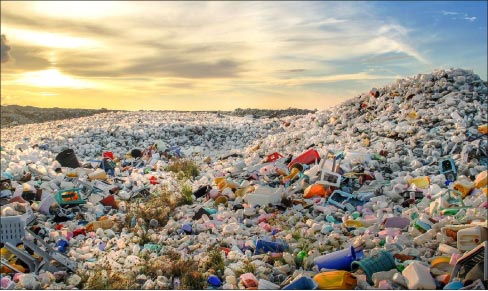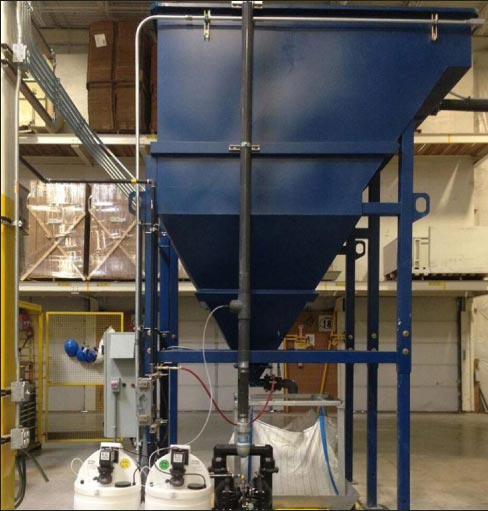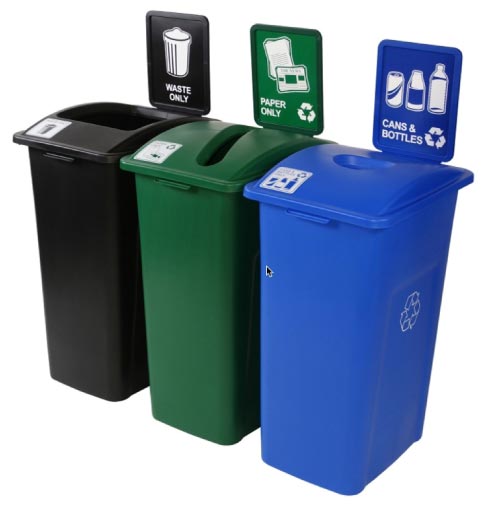PSA – More Than Straws
 |
 |
Above: Water recycling makes sense on several levels. Besides the environmental impact, most fab. processes simply work better with cleaner water.Photo courtesy Full Circle Water |
|
|
If you want to start an in-house recycle program, clearly marked bins will help your company define and manage a program. Some waste management companies will even provide recycle bins. |
Sharon Koehler
Artistic Stone Design
I have four trash cans in my kitchen. One is for trash, and one is for cardboard – as I’m an Amazon Prime and a Chewy.com member, I have a lot of cardboard. One bin is for plastic, and one is for aluminum cans. The trash goes outside to be picked up weekly. When the aluminum gets full I take it to a friend, who recycles it. The cardboard and plastic go in my recycling bin every other week to be picked up by the city contract recycling / waste management people.
I bring reusable shopping bags to the store to cut down on plastic bags, and I try to buy products with recycled content. Pilot Pens has a pen called B2P (Bottle to Pen). It takes two plastic water bottles to make each pen. To top it all off, they are good pens. I use them all the time!
These are small things, but I feel like I’m helping the planet by recycling. After all, we only have the one. It’s not like we can just pick up and move to the next one.
If you aren’t aware, plastic is the big culprit. Plastic doesn’t break down like other recyclables. It takes plastic approximately 700 years to start breaking down, and it will not completely break down for an estimated 1,000 years.
What that really means is that EVERY piece of plastic ever created is still on this earth, in some form. Worldwide, 300 million tons of plastic is created every year, but we recycle just under 10 percent. That leaves approximately 270 million tons a year to end up in landfills – or worse yet, the ocean where it injures or kills marine life.
Many companies are now seeing the error of their “plastic ways.” Starbucks, Disney and McDonalds (to name a few) have publicly announced they are going to phase out plastic straws. Many grocery stores are once again offering paper bags instead of plastic, if you forget your reusable cloth bags. Plus, many box stores now have recycling bins for plastic, electronics and batteries.
Plastic is the big culprit, but there are other things like glass, paper, cardboard, batteries and electronics that can be recycled as well. I’m sure that on a personal level, many of us recycle, but what about on a business level?
Recycling isn’t just for the residential consumer. Any business, big or small, can have a recycling program, and it’s not hard to do. The first decision you need to make is whether you want to handle it in-house or if you want to hire a company to manage it for you and then proceed accordingly.
If you choose to handle it in- house, try to roll the program out in stages. On average 80-90 percent of office waste can be recycled. Define what you want to recycle and start with one or two. Giving people all their choices in the beginning may overwhelm them and may keep them from participating.
Getting Started
The easiest thing to start with is paper. The average office generates two to three pounds of waste paper a day. The next easiest thing is aluminum (soda cans). Place your recycling bins in convenient areas and let all your employees know what’s happening.
As they get more and more comfortable with recycling you can add more bins for more items. (Suggest the employees rinse out the cans if possible, to reduce attracting ants, gnats, wasps, etc.)
When it comes to disposal, there are several different ways to handle it. If your company is small enough, you may just want to drop collected items off at your local recycling center, or drop-off is also sometimes available in the large recycling bins placed some in mall parking lots, and outside local dump sites and schools. You can also check with your waste management company and get their guidelines.
Another resource is your landlord. He may already have procedures in place to help you. You can also team up with other small businesses in your area so a waste management company will come and pick up your recyclables, if you don’t have enough by yourself for your waste management company to bother with.
If you choose to hire an outside company, make sure they handle what you want to recycle. Most companies do paper, aluminum, glass, etc. Not all do batteries, light bulbs, ink cartridges and electronics.
Water is another commodity that can be recycled. Many stone companies recycle their fabrication water. We do, and I can honestly say that the water bills here are less than the bills at my home!
I heard a story earlier this year about a stone company that did not recycle their water. Apparently, they pushed so much water out of the building that eventually it damaged the foundation of their building. They had to pay thousands upon thousands of dollars to take care of the problem, plus shut down production for a while. Then, on top of that, they were forced to put in a recycling system so it wouldn’t happen again.
Be Earth-friendly, recycle and reuse. The planet you leave behind will be the better for it, and so will your grandkids, your great grandkids and all the future generations to come.
Please send your thoughts on this article to Sharon Koehler at Sharon@asdrva.rocks.
